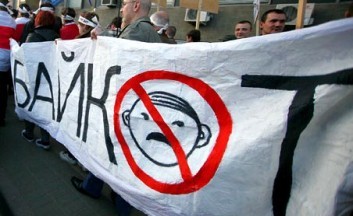Parties split over election observation
 The situation has not changed
The situation has not changed

On August 21st, 6 opposition movements announced launch of the “Just and Fair Elections for a Better Life” campaign. Earlier, on July 24th, 5 other opposition movements signed an agreement establishing an inter-party structure “For Fair Elections” to observe the elections.
Newly shaping political opposition blocs reorganize old political coalitions which were created to monitor the elections. This process brings up the issue whether the opposition as a whole has sufficient human resources to, firstly, participate (win) in the elections and, secondly, to organize election observation.
The breakup in the “For Fair Elections” election observation campaign into at least two political blocs is the result of long-term centrifugal and unifying processes within the Belarusian opposition, started after the 2010 presidential campaign.
Today, the two political coalitions to observe elections are as follows. First, “For Fair Elections” campaign includes: the Belarusian Popular Front, “For Freedom” and “Tell the Truth” movements, the Belarusian Social Democratic Party (Hramada) and the organizing committee of the Belarusian Christian Democracy party. Second, “Just and Fair Elections for a Better Life” includes: Belarusian Party of the Left “Fair World”, the United Civil Party, the Workers’ Party Organizing Committee, the Belarusian Women’s Party “Nadzeya” Organizing Committee, and the Organizing Committee of “For Fair Elections” public human rights association, and “Belaruski Rukh” movement.
The formation of two new political blocs for election observation, on the one hand, implies failed negotiations between the party leaders. On the other hand, such outcome was predetermined by the changes in the political opposition structures – currently there are two clear coalition centres (the “Troika”, advocating for a referendum, and the Left Platform) and all other actors either have to join the already existing coalitions or act independently. The coalition cores’ expansion objectively results in reshuffles in previous ‘umbrella’ coalitions, including those doing the election observation.
“European Belarus” campaign, led by former presidential candidate Sannikov adds uncertainty to this configuration by standing aside of these coalitions.
The split in the election observation campaign in Belarus is a challenge for the opposition, since it shifts priorities from struggling for political power to observing elections and reporting violations. In addition, the increased number of structures willing to observe elections implies greater demand for activists, who will be distracted from participation in the candidates’ initiative groups (or will attempt to combine both).
Finally, international organizations, which fund election observation campaigns, are the main recipients of the information about irregularities during the elections. Previous experience demonstrates, that the information about violations during elections leaves Belarusian voters mostly indifferent and does not provoke reactions sufficient to revise the elections results or the more so, to change the existing political system.
Subscribe to our newsletter




Situation in Belarus
Constitutional referendum: main consequences


 Video
Video
How to count the political prisoners: are the new criteria needed?


 Video
Video
Paternalism In Decline, Belarusian Euroscepticism, And The Influence Of Russia


 Video
Video












